Entrepreneurship and Small Business Management - Desklib
VerifiedAdded on 2020/07/22
|13
|4726
|1167
Essay
AI Summary
This essay provides a detailed overview of entrepreneurship and small business management, covering various aspects such as different types of entrepreneurial ventures and their typologies, the impact of micro and small businesses on economic growth, the essential skills and characteristics of successful entrepreneurs, and how an individual's background and experience can foster entrepreneurship. It discusses small-business entrepreneurship, large company entrepreneurs, scalable start-ups, serial entrepreneurs, social entrepreneurs, and female entrepreneurs, highlighting their similarities and differences. The essay also examines the economic impact of micro, small, and medium enterprises, focusing on employment, rural area development, and foreign direct investment. It emphasizes the importance of small businesses and start-ups in contributing to the GDP and overall economic development of a country.

ENTREPRENEURSHIP
AND
SMALL BUSINESS
MANAGEMENT
AND
SMALL BUSINESS
MANAGEMENT
Paraphrase This Document
Need a fresh take? Get an instant paraphrase of this document with our AI Paraphraser
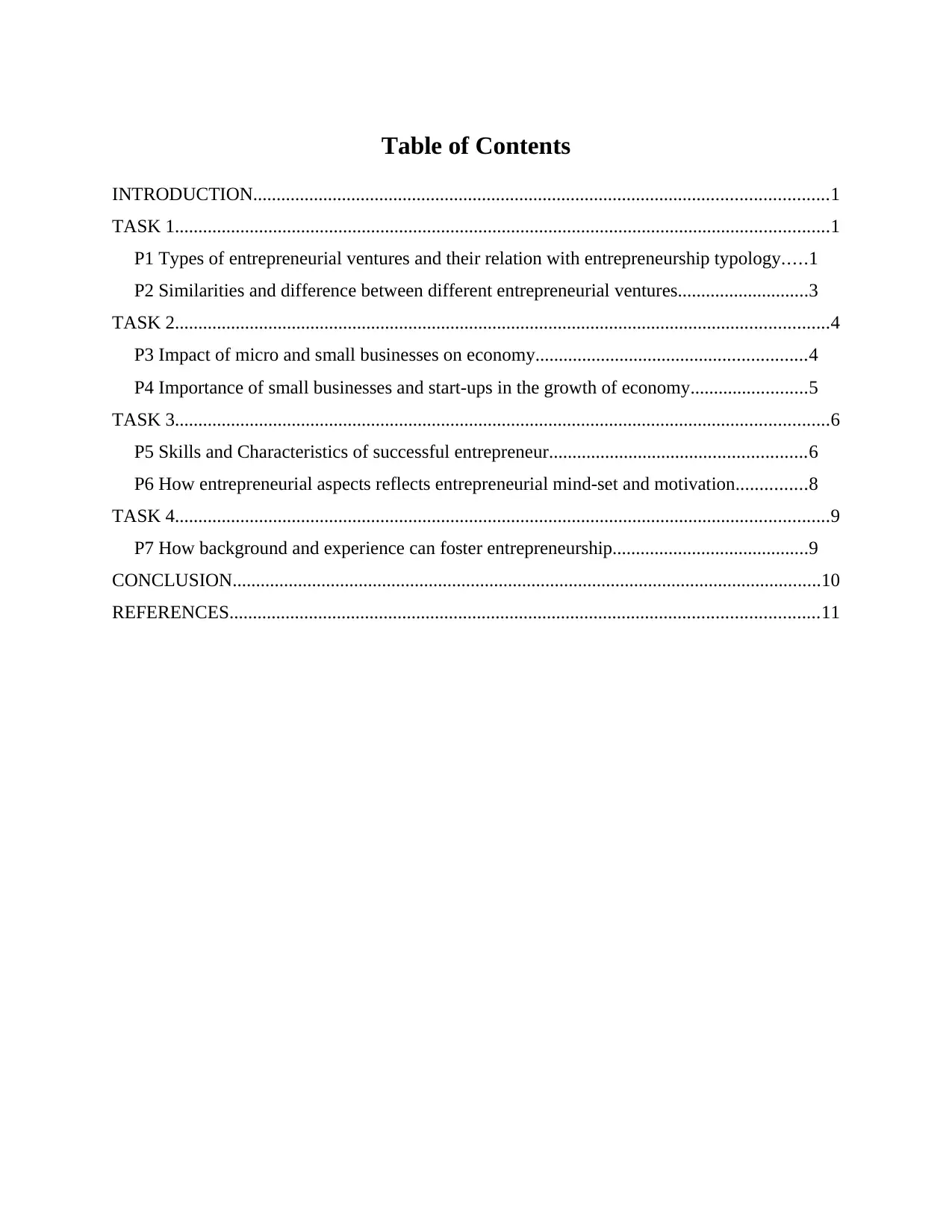
Table of Contents
INTRODUCTION...........................................................................................................................1
TASK 1............................................................................................................................................1
P1 Types of entrepreneurial ventures and their relation with entrepreneurship typology.....1
P2 Similarities and difference between different entrepreneurial ventures............................3
TASK 2............................................................................................................................................4
P3 Impact of micro and small businesses on economy..........................................................4
P4 Importance of small businesses and start-ups in the growth of economy.........................5
TASK 3............................................................................................................................................6
P5 Skills and Characteristics of successful entrepreneur.......................................................6
P6 How entrepreneurial aspects reflects entrepreneurial mind-set and motivation...............8
TASK 4............................................................................................................................................9
P7 How background and experience can foster entrepreneurship..........................................9
CONCLUSION..............................................................................................................................10
REFERENCES..............................................................................................................................11
INTRODUCTION...........................................................................................................................1
TASK 1............................................................................................................................................1
P1 Types of entrepreneurial ventures and their relation with entrepreneurship typology.....1
P2 Similarities and difference between different entrepreneurial ventures............................3
TASK 2............................................................................................................................................4
P3 Impact of micro and small businesses on economy..........................................................4
P4 Importance of small businesses and start-ups in the growth of economy.........................5
TASK 3............................................................................................................................................6
P5 Skills and Characteristics of successful entrepreneur.......................................................6
P6 How entrepreneurial aspects reflects entrepreneurial mind-set and motivation...............8
TASK 4............................................................................................................................................9
P7 How background and experience can foster entrepreneurship..........................................9
CONCLUSION..............................................................................................................................10
REFERENCES..............................................................................................................................11
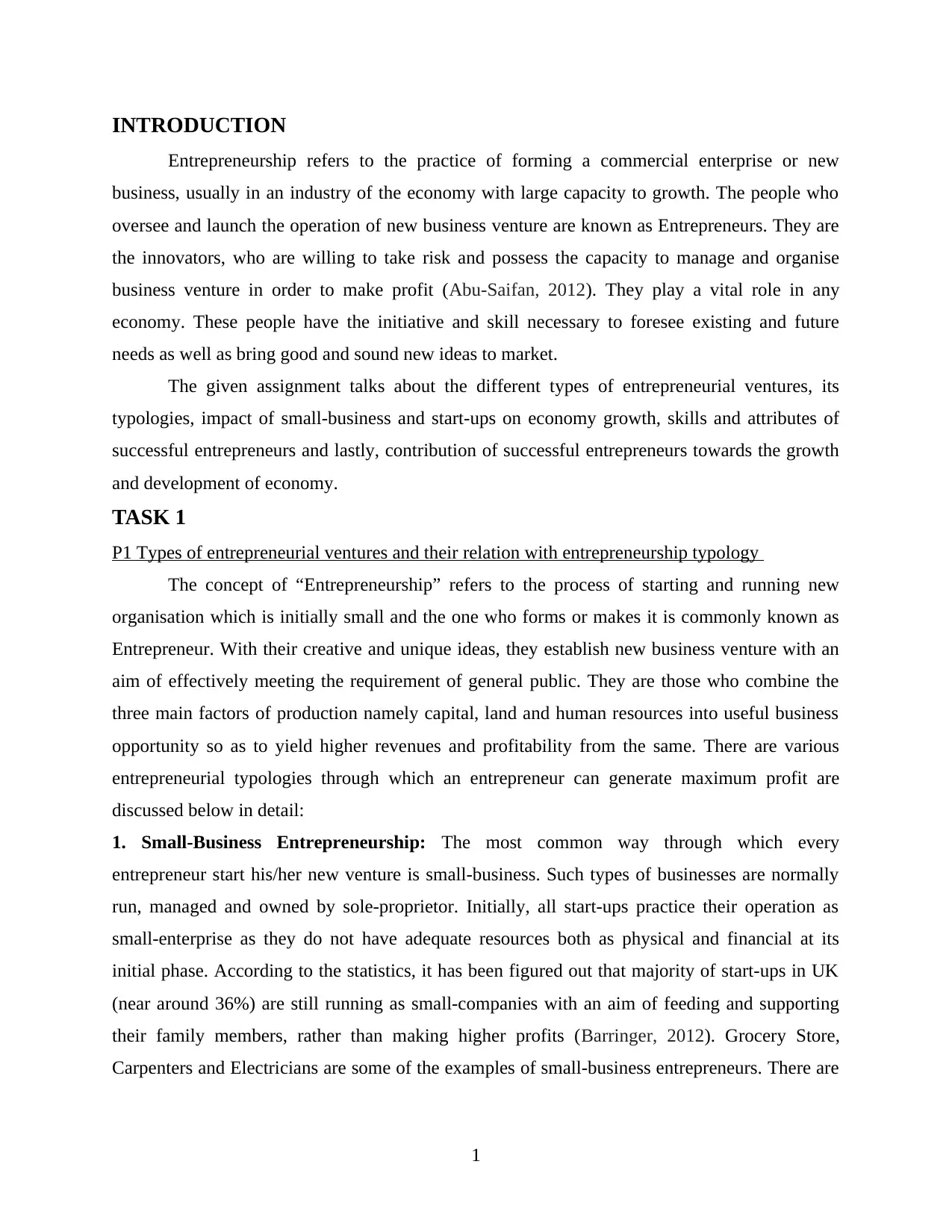
INTRODUCTION
Entrepreneurship refers to the practice of forming a commercial enterprise or new
business, usually in an industry of the economy with large capacity to growth. The people who
oversee and launch the operation of new business venture are known as Entrepreneurs. They are
the innovators, who are willing to take risk and possess the capacity to manage and organise
business venture in order to make profit (Abu-Saifan, 2012). They play a vital role in any
economy. These people have the initiative and skill necessary to foresee existing and future
needs as well as bring good and sound new ideas to market.
The given assignment talks about the different types of entrepreneurial ventures, its
typologies, impact of small-business and start-ups on economy growth, skills and attributes of
successful entrepreneurs and lastly, contribution of successful entrepreneurs towards the growth
and development of economy.
TASK 1
P1 Types of entrepreneurial ventures and their relation with entrepreneurship typology
The concept of “Entrepreneurship” refers to the process of starting and running new
organisation which is initially small and the one who forms or makes it is commonly known as
Entrepreneur. With their creative and unique ideas, they establish new business venture with an
aim of effectively meeting the requirement of general public. They are those who combine the
three main factors of production namely capital, land and human resources into useful business
opportunity so as to yield higher revenues and profitability from the same. There are various
entrepreneurial typologies through which an entrepreneur can generate maximum profit are
discussed below in detail:
1. Small-Business Entrepreneurship: The most common way through which every
entrepreneur start his/her new venture is small-business. Such types of businesses are normally
run, managed and owned by sole-proprietor. Initially, all start-ups practice their operation as
small-enterprise as they do not have adequate resources both as physical and financial at its
initial phase. According to the statistics, it has been figured out that majority of start-ups in UK
(near around 36%) are still running as small-companies with an aim of feeding and supporting
their family members, rather than making higher profits (Barringer, 2012). Grocery Store,
Carpenters and Electricians are some of the examples of small-business entrepreneurs. There are
1
Entrepreneurship refers to the practice of forming a commercial enterprise or new
business, usually in an industry of the economy with large capacity to growth. The people who
oversee and launch the operation of new business venture are known as Entrepreneurs. They are
the innovators, who are willing to take risk and possess the capacity to manage and organise
business venture in order to make profit (Abu-Saifan, 2012). They play a vital role in any
economy. These people have the initiative and skill necessary to foresee existing and future
needs as well as bring good and sound new ideas to market.
The given assignment talks about the different types of entrepreneurial ventures, its
typologies, impact of small-business and start-ups on economy growth, skills and attributes of
successful entrepreneurs and lastly, contribution of successful entrepreneurs towards the growth
and development of economy.
TASK 1
P1 Types of entrepreneurial ventures and their relation with entrepreneurship typology
The concept of “Entrepreneurship” refers to the process of starting and running new
organisation which is initially small and the one who forms or makes it is commonly known as
Entrepreneur. With their creative and unique ideas, they establish new business venture with an
aim of effectively meeting the requirement of general public. They are those who combine the
three main factors of production namely capital, land and human resources into useful business
opportunity so as to yield higher revenues and profitability from the same. There are various
entrepreneurial typologies through which an entrepreneur can generate maximum profit are
discussed below in detail:
1. Small-Business Entrepreneurship: The most common way through which every
entrepreneur start his/her new venture is small-business. Such types of businesses are normally
run, managed and owned by sole-proprietor. Initially, all start-ups practice their operation as
small-enterprise as they do not have adequate resources both as physical and financial at its
initial phase. According to the statistics, it has been figured out that majority of start-ups in UK
(near around 36%) are still running as small-companies with an aim of feeding and supporting
their family members, rather than making higher profits (Barringer, 2012). Grocery Store,
Carpenters and Electricians are some of the examples of small-business entrepreneurs. There are
1
⊘ This is a preview!⊘
Do you want full access?
Subscribe today to unlock all pages.

Trusted by 1+ million students worldwide
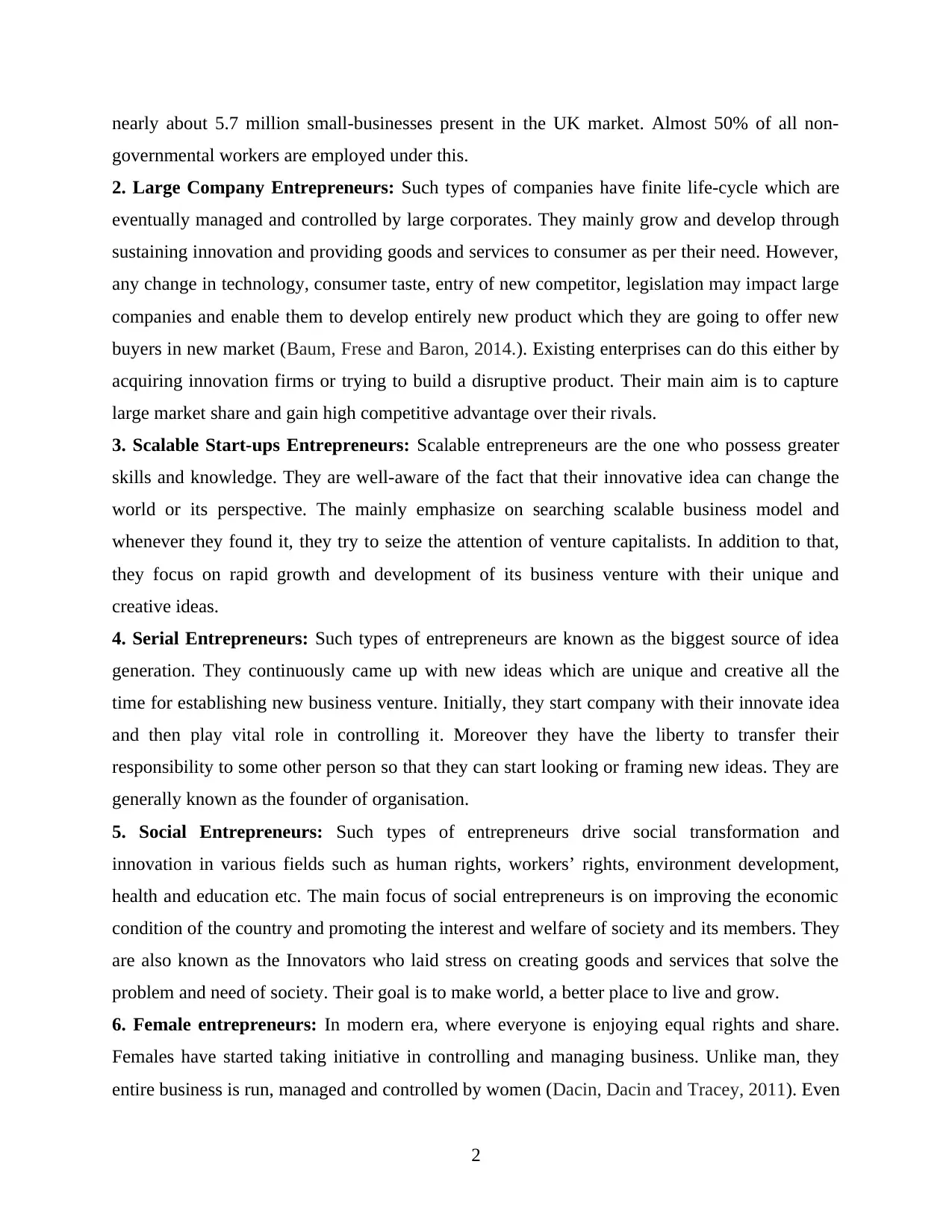
nearly about 5.7 million small-businesses present in the UK market. Almost 50% of all non-
governmental workers are employed under this.
2. Large Company Entrepreneurs: Such types of companies have finite life-cycle which are
eventually managed and controlled by large corporates. They mainly grow and develop through
sustaining innovation and providing goods and services to consumer as per their need. However,
any change in technology, consumer taste, entry of new competitor, legislation may impact large
companies and enable them to develop entirely new product which they are going to offer new
buyers in new market (Baum, Frese and Baron, 2014.). Existing enterprises can do this either by
acquiring innovation firms or trying to build a disruptive product. Their main aim is to capture
large market share and gain high competitive advantage over their rivals.
3. Scalable Start-ups Entrepreneurs: Scalable entrepreneurs are the one who possess greater
skills and knowledge. They are well-aware of the fact that their innovative idea can change the
world or its perspective. The mainly emphasize on searching scalable business model and
whenever they found it, they try to seize the attention of venture capitalists. In addition to that,
they focus on rapid growth and development of its business venture with their unique and
creative ideas.
4. Serial Entrepreneurs: Such types of entrepreneurs are known as the biggest source of idea
generation. They continuously came up with new ideas which are unique and creative all the
time for establishing new business venture. Initially, they start company with their innovate idea
and then play vital role in controlling it. Moreover they have the liberty to transfer their
responsibility to some other person so that they can start looking or framing new ideas. They are
generally known as the founder of organisation.
5. Social Entrepreneurs: Such types of entrepreneurs drive social transformation and
innovation in various fields such as human rights, workers’ rights, environment development,
health and education etc. The main focus of social entrepreneurs is on improving the economic
condition of the country and promoting the interest and welfare of society and its members. They
are also known as the Innovators who laid stress on creating goods and services that solve the
problem and need of society. Their goal is to make world, a better place to live and grow.
6. Female entrepreneurs: In modern era, where everyone is enjoying equal rights and share.
Females have started taking initiative in controlling and managing business. Unlike man, they
entire business is run, managed and controlled by women (Dacin, Dacin and Tracey, 2011). Even
2
governmental workers are employed under this.
2. Large Company Entrepreneurs: Such types of companies have finite life-cycle which are
eventually managed and controlled by large corporates. They mainly grow and develop through
sustaining innovation and providing goods and services to consumer as per their need. However,
any change in technology, consumer taste, entry of new competitor, legislation may impact large
companies and enable them to develop entirely new product which they are going to offer new
buyers in new market (Baum, Frese and Baron, 2014.). Existing enterprises can do this either by
acquiring innovation firms or trying to build a disruptive product. Their main aim is to capture
large market share and gain high competitive advantage over their rivals.
3. Scalable Start-ups Entrepreneurs: Scalable entrepreneurs are the one who possess greater
skills and knowledge. They are well-aware of the fact that their innovative idea can change the
world or its perspective. The mainly emphasize on searching scalable business model and
whenever they found it, they try to seize the attention of venture capitalists. In addition to that,
they focus on rapid growth and development of its business venture with their unique and
creative ideas.
4. Serial Entrepreneurs: Such types of entrepreneurs are known as the biggest source of idea
generation. They continuously came up with new ideas which are unique and creative all the
time for establishing new business venture. Initially, they start company with their innovate idea
and then play vital role in controlling it. Moreover they have the liberty to transfer their
responsibility to some other person so that they can start looking or framing new ideas. They are
generally known as the founder of organisation.
5. Social Entrepreneurs: Such types of entrepreneurs drive social transformation and
innovation in various fields such as human rights, workers’ rights, environment development,
health and education etc. The main focus of social entrepreneurs is on improving the economic
condition of the country and promoting the interest and welfare of society and its members. They
are also known as the Innovators who laid stress on creating goods and services that solve the
problem and need of society. Their goal is to make world, a better place to live and grow.
6. Female entrepreneurs: In modern era, where everyone is enjoying equal rights and share.
Females have started taking initiative in controlling and managing business. Unlike man, they
entire business is run, managed and controlled by women (Dacin, Dacin and Tracey, 2011). Even
2
Paraphrase This Document
Need a fresh take? Get an instant paraphrase of this document with our AI Paraphraser
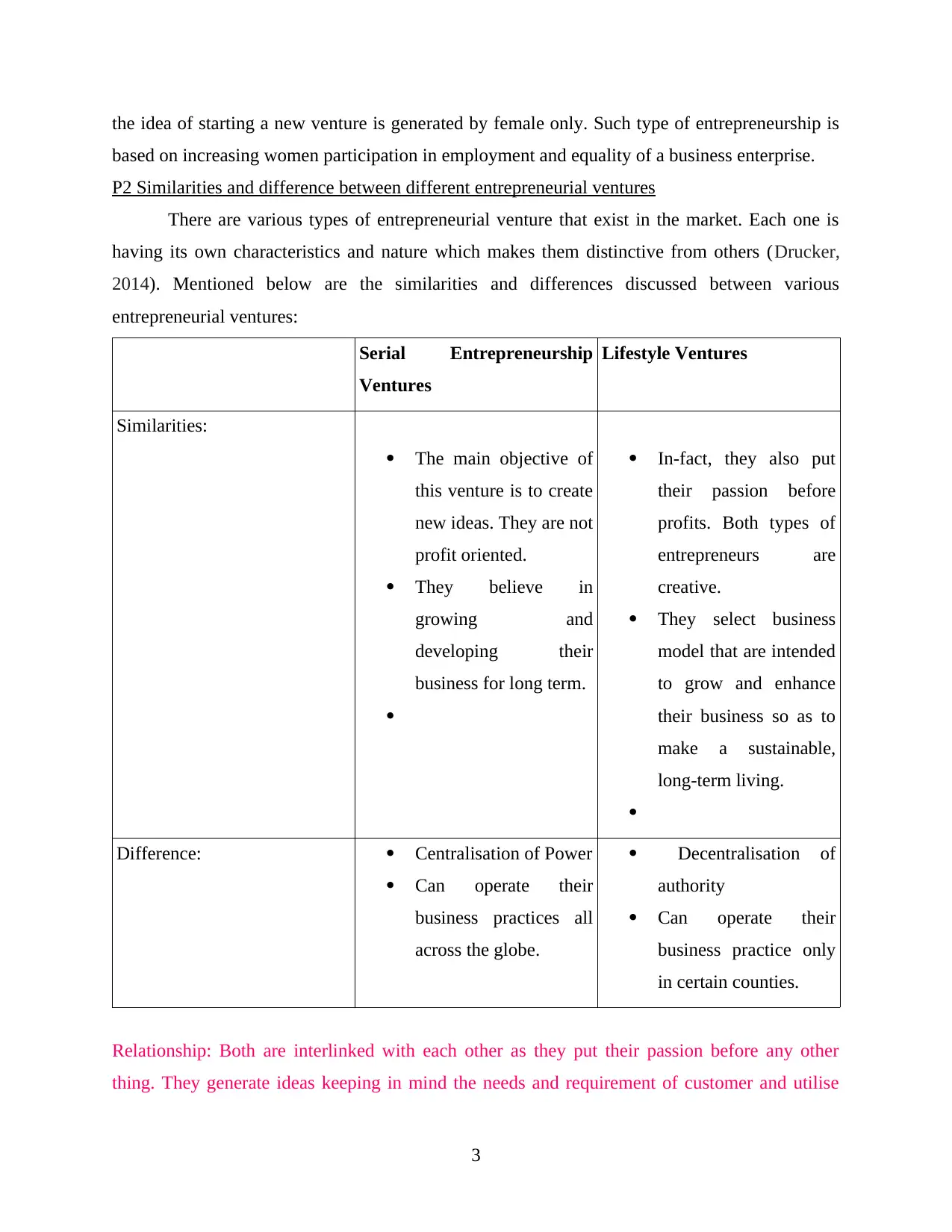
the idea of starting a new venture is generated by female only. Such type of entrepreneurship is
based on increasing women participation in employment and equality of a business enterprise.
P2 Similarities and difference between different entrepreneurial ventures
There are various types of entrepreneurial venture that exist in the market. Each one is
having its own characteristics and nature which makes them distinctive from others (Drucker,
2014). Mentioned below are the similarities and differences discussed between various
entrepreneurial ventures:
Serial Entrepreneurship
Ventures
Lifestyle Ventures
Similarities:
The main objective of
this venture is to create
new ideas. They are not
profit oriented.
They believe in
growing and
developing their
business for long term.
In-fact, they also put
their passion before
profits. Both types of
entrepreneurs are
creative.
They select business
model that are intended
to grow and enhance
their business so as to
make a sustainable,
long-term living.
Difference: Centralisation of Power
Can operate their
business practices all
across the globe.
Decentralisation of
authority
Can operate their
business practice only
in certain counties.
Relationship: Both are interlinked with each other as they put their passion before any other
thing. They generate ideas keeping in mind the needs and requirement of customer and utilise
3
based on increasing women participation in employment and equality of a business enterprise.
P2 Similarities and difference between different entrepreneurial ventures
There are various types of entrepreneurial venture that exist in the market. Each one is
having its own characteristics and nature which makes them distinctive from others (Drucker,
2014). Mentioned below are the similarities and differences discussed between various
entrepreneurial ventures:
Serial Entrepreneurship
Ventures
Lifestyle Ventures
Similarities:
The main objective of
this venture is to create
new ideas. They are not
profit oriented.
They believe in
growing and
developing their
business for long term.
In-fact, they also put
their passion before
profits. Both types of
entrepreneurs are
creative.
They select business
model that are intended
to grow and enhance
their business so as to
make a sustainable,
long-term living.
Difference: Centralisation of Power
Can operate their
business practices all
across the globe.
Decentralisation of
authority
Can operate their
business practice only
in certain counties.
Relationship: Both are interlinked with each other as they put their passion before any other
thing. They generate ideas keeping in mind the needs and requirement of customer and utilise
3
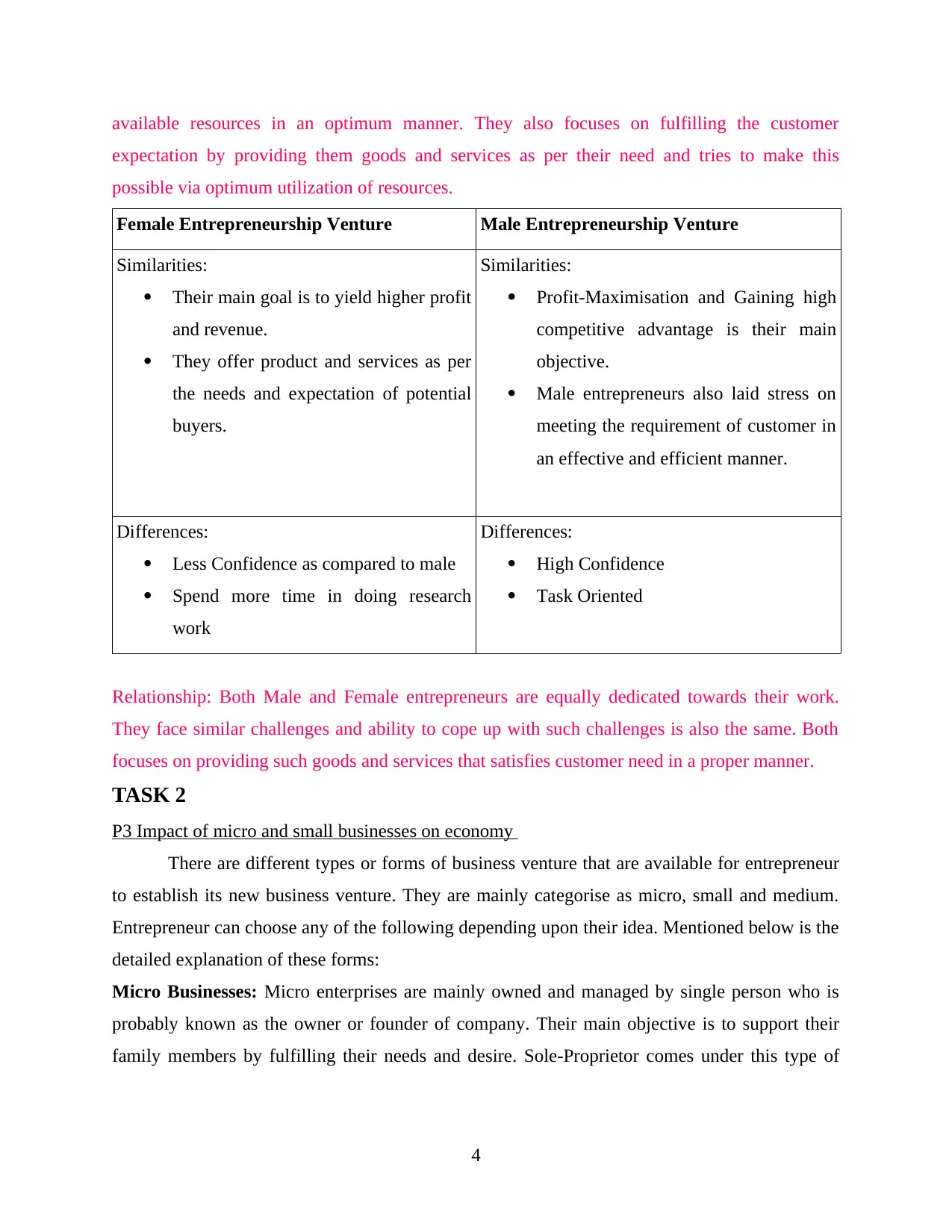
available resources in an optimum manner. They also focuses on fulfilling the customer
expectation by providing them goods and services as per their need and tries to make this
possible via optimum utilization of resources.
Female Entrepreneurship Venture Male Entrepreneurship Venture
Similarities:
Their main goal is to yield higher profit
and revenue.
They offer product and services as per
the needs and expectation of potential
buyers.
Similarities:
Profit-Maximisation and Gaining high
competitive advantage is their main
objective.
Male entrepreneurs also laid stress on
meeting the requirement of customer in
an effective and efficient manner.
Differences:
Less Confidence as compared to male
Spend more time in doing research
work
Differences:
High Confidence
Task Oriented
Relationship: Both Male and Female entrepreneurs are equally dedicated towards their work.
They face similar challenges and ability to cope up with such challenges is also the same. Both
focuses on providing such goods and services that satisfies customer need in a proper manner.
TASK 2
P3 Impact of micro and small businesses on economy
There are different types or forms of business venture that are available for entrepreneur
to establish its new business venture. They are mainly categorise as micro, small and medium.
Entrepreneur can choose any of the following depending upon their idea. Mentioned below is the
detailed explanation of these forms:
Micro Businesses: Micro enterprises are mainly owned and managed by single person who is
probably known as the owner or founder of company. Their main objective is to support their
family members by fulfilling their needs and desire. Sole-Proprietor comes under this type of
4
expectation by providing them goods and services as per their need and tries to make this
possible via optimum utilization of resources.
Female Entrepreneurship Venture Male Entrepreneurship Venture
Similarities:
Their main goal is to yield higher profit
and revenue.
They offer product and services as per
the needs and expectation of potential
buyers.
Similarities:
Profit-Maximisation and Gaining high
competitive advantage is their main
objective.
Male entrepreneurs also laid stress on
meeting the requirement of customer in
an effective and efficient manner.
Differences:
Less Confidence as compared to male
Spend more time in doing research
work
Differences:
High Confidence
Task Oriented
Relationship: Both Male and Female entrepreneurs are equally dedicated towards their work.
They face similar challenges and ability to cope up with such challenges is also the same. Both
focuses on providing such goods and services that satisfies customer need in a proper manner.
TASK 2
P3 Impact of micro and small businesses on economy
There are different types or forms of business venture that are available for entrepreneur
to establish its new business venture. They are mainly categorise as micro, small and medium.
Entrepreneur can choose any of the following depending upon their idea. Mentioned below is the
detailed explanation of these forms:
Micro Businesses: Micro enterprises are mainly owned and managed by single person who is
probably known as the owner or founder of company. Their main objective is to support their
family members by fulfilling their needs and desire. Sole-Proprietor comes under this type of
4
⊘ This is a preview!⊘
Do you want full access?
Subscribe today to unlock all pages.

Trusted by 1+ million students worldwide
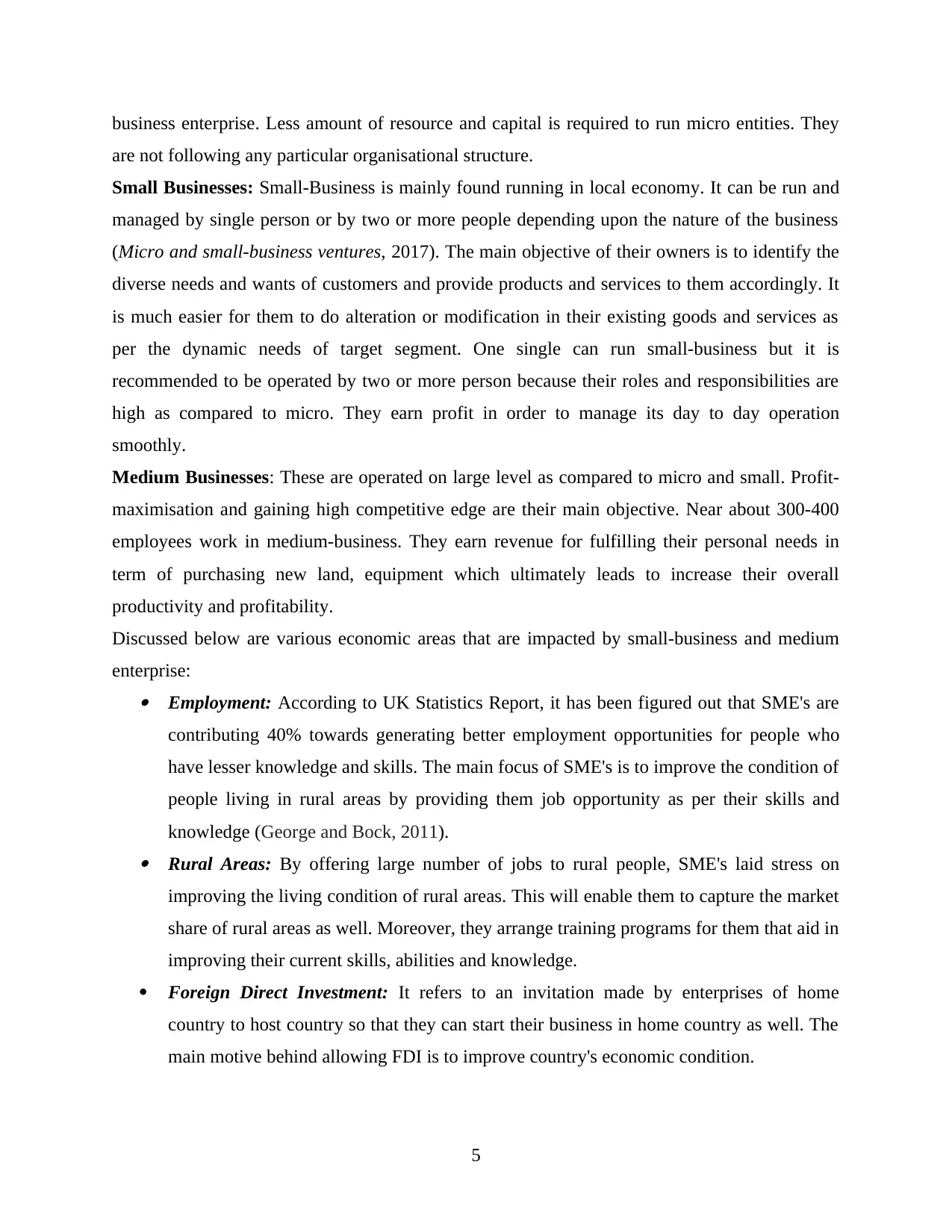
business enterprise. Less amount of resource and capital is required to run micro entities. They
are not following any particular organisational structure.
Small Businesses: Small-Business is mainly found running in local economy. It can be run and
managed by single person or by two or more people depending upon the nature of the business
(Micro and small-business ventures, 2017). The main objective of their owners is to identify the
diverse needs and wants of customers and provide products and services to them accordingly. It
is much easier for them to do alteration or modification in their existing goods and services as
per the dynamic needs of target segment. One single can run small-business but it is
recommended to be operated by two or more person because their roles and responsibilities are
high as compared to micro. They earn profit in order to manage its day to day operation
smoothly.
Medium Businesses: These are operated on large level as compared to micro and small. Profit-
maximisation and gaining high competitive edge are their main objective. Near about 300-400
employees work in medium-business. They earn revenue for fulfilling their personal needs in
term of purchasing new land, equipment which ultimately leads to increase their overall
productivity and profitability.
Discussed below are various economic areas that are impacted by small-business and medium
enterprise: Employment: According to UK Statistics Report, it has been figured out that SME's are
contributing 40% towards generating better employment opportunities for people who
have lesser knowledge and skills. The main focus of SME's is to improve the condition of
people living in rural areas by providing them job opportunity as per their skills and
knowledge (George and Bock, 2011). Rural Areas: By offering large number of jobs to rural people, SME's laid stress on
improving the living condition of rural areas. This will enable them to capture the market
share of rural areas as well. Moreover, they arrange training programs for them that aid in
improving their current skills, abilities and knowledge.
Foreign Direct Investment: It refers to an invitation made by enterprises of home
country to host country so that they can start their business in home country as well. The
main motive behind allowing FDI is to improve country's economic condition.
5
are not following any particular organisational structure.
Small Businesses: Small-Business is mainly found running in local economy. It can be run and
managed by single person or by two or more people depending upon the nature of the business
(Micro and small-business ventures, 2017). The main objective of their owners is to identify the
diverse needs and wants of customers and provide products and services to them accordingly. It
is much easier for them to do alteration or modification in their existing goods and services as
per the dynamic needs of target segment. One single can run small-business but it is
recommended to be operated by two or more person because their roles and responsibilities are
high as compared to micro. They earn profit in order to manage its day to day operation
smoothly.
Medium Businesses: These are operated on large level as compared to micro and small. Profit-
maximisation and gaining high competitive edge are their main objective. Near about 300-400
employees work in medium-business. They earn revenue for fulfilling their personal needs in
term of purchasing new land, equipment which ultimately leads to increase their overall
productivity and profitability.
Discussed below are various economic areas that are impacted by small-business and medium
enterprise: Employment: According to UK Statistics Report, it has been figured out that SME's are
contributing 40% towards generating better employment opportunities for people who
have lesser knowledge and skills. The main focus of SME's is to improve the condition of
people living in rural areas by providing them job opportunity as per their skills and
knowledge (George and Bock, 2011). Rural Areas: By offering large number of jobs to rural people, SME's laid stress on
improving the living condition of rural areas. This will enable them to capture the market
share of rural areas as well. Moreover, they arrange training programs for them that aid in
improving their current skills, abilities and knowledge.
Foreign Direct Investment: It refers to an invitation made by enterprises of home
country to host country so that they can start their business in home country as well. The
main motive behind allowing FDI is to improve country's economic condition.
5
Paraphrase This Document
Need a fresh take? Get an instant paraphrase of this document with our AI Paraphraser
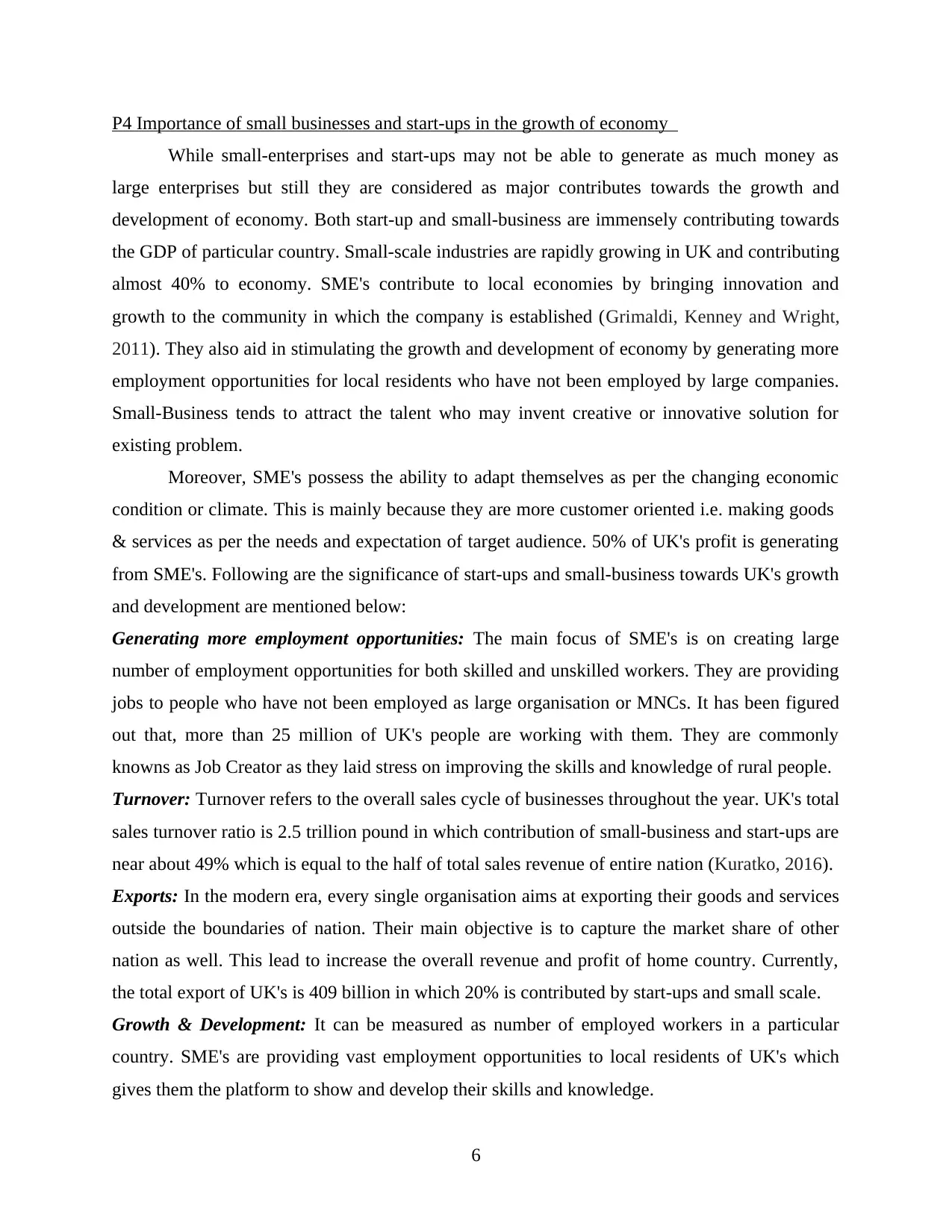
P4 Importance of small businesses and start-ups in the growth of economy
While small-enterprises and start-ups may not be able to generate as much money as
large enterprises but still they are considered as major contributes towards the growth and
development of economy. Both start-up and small-business are immensely contributing towards
the GDP of particular country. Small-scale industries are rapidly growing in UK and contributing
almost 40% to economy. SME's contribute to local economies by bringing innovation and
growth to the community in which the company is established (Grimaldi, Kenney and Wright,
2011). They also aid in stimulating the growth and development of economy by generating more
employment opportunities for local residents who have not been employed by large companies.
Small-Business tends to attract the talent who may invent creative or innovative solution for
existing problem.
Moreover, SME's possess the ability to adapt themselves as per the changing economic
condition or climate. This is mainly because they are more customer oriented i.e. making goods
& services as per the needs and expectation of target audience. 50% of UK's profit is generating
from SME's. Following are the significance of start-ups and small-business towards UK's growth
and development are mentioned below:
Generating more employment opportunities: The main focus of SME's is on creating large
number of employment opportunities for both skilled and unskilled workers. They are providing
jobs to people who have not been employed as large organisation or MNCs. It has been figured
out that, more than 25 million of UK's people are working with them. They are commonly
knowns as Job Creator as they laid stress on improving the skills and knowledge of rural people.
Turnover: Turnover refers to the overall sales cycle of businesses throughout the year. UK's total
sales turnover ratio is 2.5 trillion pound in which contribution of small-business and start-ups are
near about 49% which is equal to the half of total sales revenue of entire nation (Kuratko, 2016).
Exports: In the modern era, every single organisation aims at exporting their goods and services
outside the boundaries of nation. Their main objective is to capture the market share of other
nation as well. This lead to increase the overall revenue and profit of home country. Currently,
the total export of UK's is 409 billion in which 20% is contributed by start-ups and small scale.
Growth & Development: It can be measured as number of employed workers in a particular
country. SME's are providing vast employment opportunities to local residents of UK's which
gives them the platform to show and develop their skills and knowledge.
6
While small-enterprises and start-ups may not be able to generate as much money as
large enterprises but still they are considered as major contributes towards the growth and
development of economy. Both start-up and small-business are immensely contributing towards
the GDP of particular country. Small-scale industries are rapidly growing in UK and contributing
almost 40% to economy. SME's contribute to local economies by bringing innovation and
growth to the community in which the company is established (Grimaldi, Kenney and Wright,
2011). They also aid in stimulating the growth and development of economy by generating more
employment opportunities for local residents who have not been employed by large companies.
Small-Business tends to attract the talent who may invent creative or innovative solution for
existing problem.
Moreover, SME's possess the ability to adapt themselves as per the changing economic
condition or climate. This is mainly because they are more customer oriented i.e. making goods
& services as per the needs and expectation of target audience. 50% of UK's profit is generating
from SME's. Following are the significance of start-ups and small-business towards UK's growth
and development are mentioned below:
Generating more employment opportunities: The main focus of SME's is on creating large
number of employment opportunities for both skilled and unskilled workers. They are providing
jobs to people who have not been employed as large organisation or MNCs. It has been figured
out that, more than 25 million of UK's people are working with them. They are commonly
knowns as Job Creator as they laid stress on improving the skills and knowledge of rural people.
Turnover: Turnover refers to the overall sales cycle of businesses throughout the year. UK's total
sales turnover ratio is 2.5 trillion pound in which contribution of small-business and start-ups are
near about 49% which is equal to the half of total sales revenue of entire nation (Kuratko, 2016).
Exports: In the modern era, every single organisation aims at exporting their goods and services
outside the boundaries of nation. Their main objective is to capture the market share of other
nation as well. This lead to increase the overall revenue and profit of home country. Currently,
the total export of UK's is 409 billion in which 20% is contributed by start-ups and small scale.
Growth & Development: It can be measured as number of employed workers in a particular
country. SME's are providing vast employment opportunities to local residents of UK's which
gives them the platform to show and develop their skills and knowledge.
6

TASK 3
P5 Skills and Characteristics of successful entrepreneur
An entrepreneur is the one who possess great innovation knowledge and skills and
establishing new organisational venture along with different types of risk associated with it in the
hope of making higher profits. They try all possible efforts so as to make its business idea
successful. Such types of entrepreneurs possess strong inner drive that keeps motivating them
and enable them to follow their passion. Each of them owns different traits and characteristics
which makes them the man they are today:
Jeff Bezoz: He is the Chief Executive Officer and founder of world's most famous online
shopping website Amazon.com. Jeff has founded the organisation in the year 1994. Initially, he
started the website by selling books to large number of people who loves reading books. With
the passage of time, he expanded their website by selling large amount of products and services
that satisfies almost every need of the customer. His aim was to create a platform or website
where individual can get anything they desire for. The idea was generated in late 90s when
Internet was booming at higher rate (Martin, McNally and Kay, 2013). In-fact Jeff left his job for
fulfilling his dream and the result is in the form world's leading online shopping website
AMAZON.COM. Following are the list of some of its traits and characteristics:
1. Risk Taker: He is famous for taking high risk but in systematic and calculated manner.
He left his well-paying job so as to follow his dream. He has made up his mind to start
his own new business venture. He started his business with very little amount of money.
The only investor he is having were his parents. He was aware of the fact that there are
70% chances of his business failure but his determination did not let him down and as a
result he falls in the list of world's richest man today with a net worth of US$ 106 billion.
2. Highly Competitive: One of the most notable attribute of Jeff Bezoz is he is highly
competitive. He not only craves for competition but tries to elimination it also. His
company was once targeted by some fellow competitors selling child products which
enable them to drop down their prices dramatically in order to eradicate or remove it
permanently from the race. As a result, rivalry firm collapsed.
3. Knack for Innovation: He also gained popularity for his innovative skills. From his
childhood day he renowned as little Innovator of his house. He develops sound alarm so
7
P5 Skills and Characteristics of successful entrepreneur
An entrepreneur is the one who possess great innovation knowledge and skills and
establishing new organisational venture along with different types of risk associated with it in the
hope of making higher profits. They try all possible efforts so as to make its business idea
successful. Such types of entrepreneurs possess strong inner drive that keeps motivating them
and enable them to follow their passion. Each of them owns different traits and characteristics
which makes them the man they are today:
Jeff Bezoz: He is the Chief Executive Officer and founder of world's most famous online
shopping website Amazon.com. Jeff has founded the organisation in the year 1994. Initially, he
started the website by selling books to large number of people who loves reading books. With
the passage of time, he expanded their website by selling large amount of products and services
that satisfies almost every need of the customer. His aim was to create a platform or website
where individual can get anything they desire for. The idea was generated in late 90s when
Internet was booming at higher rate (Martin, McNally and Kay, 2013). In-fact Jeff left his job for
fulfilling his dream and the result is in the form world's leading online shopping website
AMAZON.COM. Following are the list of some of its traits and characteristics:
1. Risk Taker: He is famous for taking high risk but in systematic and calculated manner.
He left his well-paying job so as to follow his dream. He has made up his mind to start
his own new business venture. He started his business with very little amount of money.
The only investor he is having were his parents. He was aware of the fact that there are
70% chances of his business failure but his determination did not let him down and as a
result he falls in the list of world's richest man today with a net worth of US$ 106 billion.
2. Highly Competitive: One of the most notable attribute of Jeff Bezoz is he is highly
competitive. He not only craves for competition but tries to elimination it also. His
company was once targeted by some fellow competitors selling child products which
enable them to drop down their prices dramatically in order to eradicate or remove it
permanently from the race. As a result, rivalry firm collapsed.
3. Knack for Innovation: He also gained popularity for his innovative skills. From his
childhood day he renowned as little Innovator of his house. He develops sound alarm so
7
⊘ This is a preview!⊘
Do you want full access?
Subscribe today to unlock all pages.

Trusted by 1+ million students worldwide
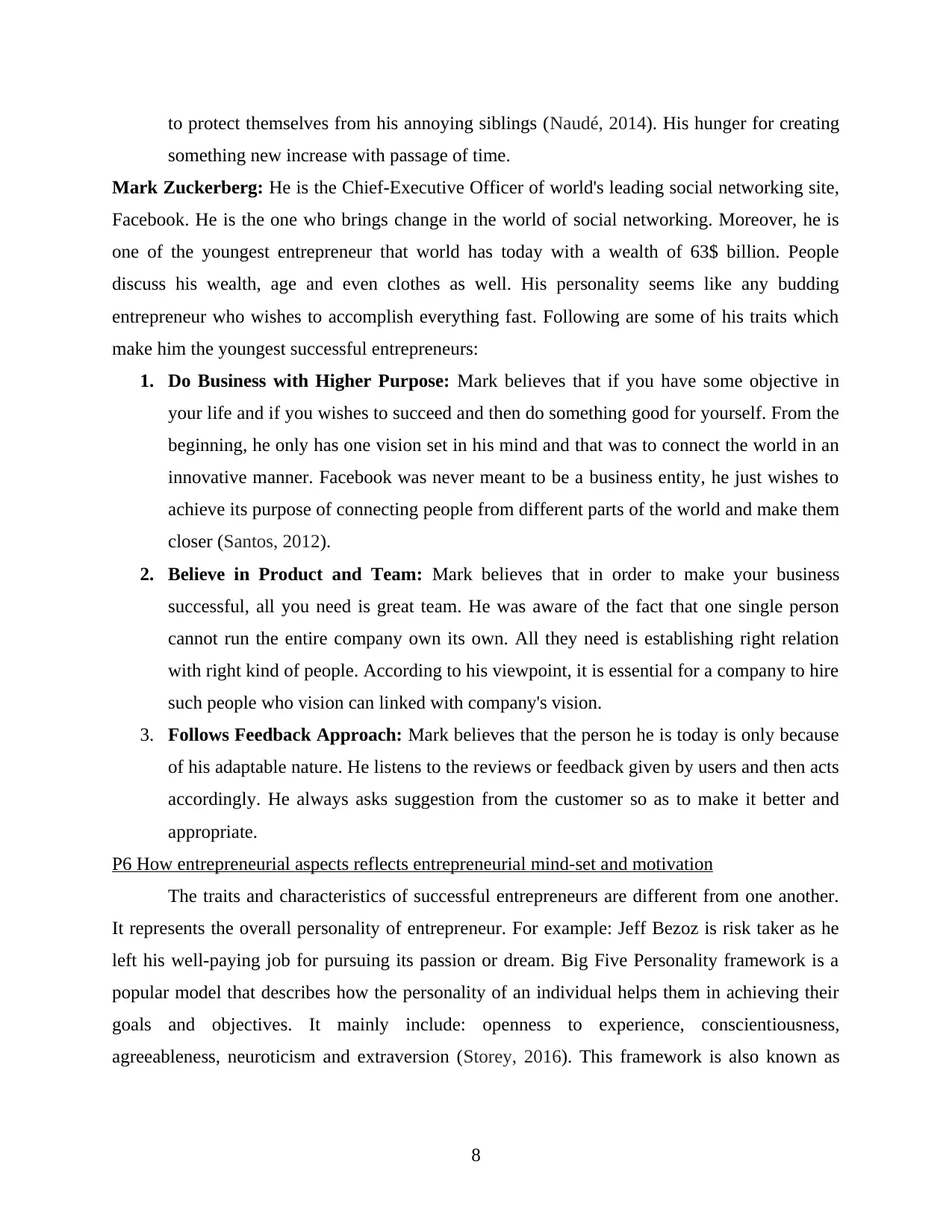
to protect themselves from his annoying siblings (Naudé, 2014). His hunger for creating
something new increase with passage of time.
Mark Zuckerberg: He is the Chief-Executive Officer of world's leading social networking site,
Facebook. He is the one who brings change in the world of social networking. Moreover, he is
one of the youngest entrepreneur that world has today with a wealth of 63$ billion. People
discuss his wealth, age and even clothes as well. His personality seems like any budding
entrepreneur who wishes to accomplish everything fast. Following are some of his traits which
make him the youngest successful entrepreneurs:
1. Do Business with Higher Purpose: Mark believes that if you have some objective in
your life and if you wishes to succeed and then do something good for yourself. From the
beginning, he only has one vision set in his mind and that was to connect the world in an
innovative manner. Facebook was never meant to be a business entity, he just wishes to
achieve its purpose of connecting people from different parts of the world and make them
closer (Santos, 2012).
2. Believe in Product and Team: Mark believes that in order to make your business
successful, all you need is great team. He was aware of the fact that one single person
cannot run the entire company own its own. All they need is establishing right relation
with right kind of people. According to his viewpoint, it is essential for a company to hire
such people who vision can linked with company's vision.
3. Follows Feedback Approach: Mark believes that the person he is today is only because
of his adaptable nature. He listens to the reviews or feedback given by users and then acts
accordingly. He always asks suggestion from the customer so as to make it better and
appropriate.
P6 How entrepreneurial aspects reflects entrepreneurial mind-set and motivation
The traits and characteristics of successful entrepreneurs are different from one another.
It represents the overall personality of entrepreneur. For example: Jeff Bezoz is risk taker as he
left his well-paying job for pursuing its passion or dream. Big Five Personality framework is a
popular model that describes how the personality of an individual helps them in achieving their
goals and objectives. It mainly include: openness to experience, conscientiousness,
agreeableness, neuroticism and extraversion (Storey, 2016). This framework is also known as
8
something new increase with passage of time.
Mark Zuckerberg: He is the Chief-Executive Officer of world's leading social networking site,
Facebook. He is the one who brings change in the world of social networking. Moreover, he is
one of the youngest entrepreneur that world has today with a wealth of 63$ billion. People
discuss his wealth, age and even clothes as well. His personality seems like any budding
entrepreneur who wishes to accomplish everything fast. Following are some of his traits which
make him the youngest successful entrepreneurs:
1. Do Business with Higher Purpose: Mark believes that if you have some objective in
your life and if you wishes to succeed and then do something good for yourself. From the
beginning, he only has one vision set in his mind and that was to connect the world in an
innovative manner. Facebook was never meant to be a business entity, he just wishes to
achieve its purpose of connecting people from different parts of the world and make them
closer (Santos, 2012).
2. Believe in Product and Team: Mark believes that in order to make your business
successful, all you need is great team. He was aware of the fact that one single person
cannot run the entire company own its own. All they need is establishing right relation
with right kind of people. According to his viewpoint, it is essential for a company to hire
such people who vision can linked with company's vision.
3. Follows Feedback Approach: Mark believes that the person he is today is only because
of his adaptable nature. He listens to the reviews or feedback given by users and then acts
accordingly. He always asks suggestion from the customer so as to make it better and
appropriate.
P6 How entrepreneurial aspects reflects entrepreneurial mind-set and motivation
The traits and characteristics of successful entrepreneurs are different from one another.
It represents the overall personality of entrepreneur. For example: Jeff Bezoz is risk taker as he
left his well-paying job for pursuing its passion or dream. Big Five Personality framework is a
popular model that describes how the personality of an individual helps them in achieving their
goals and objectives. It mainly include: openness to experience, conscientiousness,
agreeableness, neuroticism and extraversion (Storey, 2016). This framework is also known as
8
Paraphrase This Document
Need a fresh take? Get an instant paraphrase of this document with our AI Paraphraser
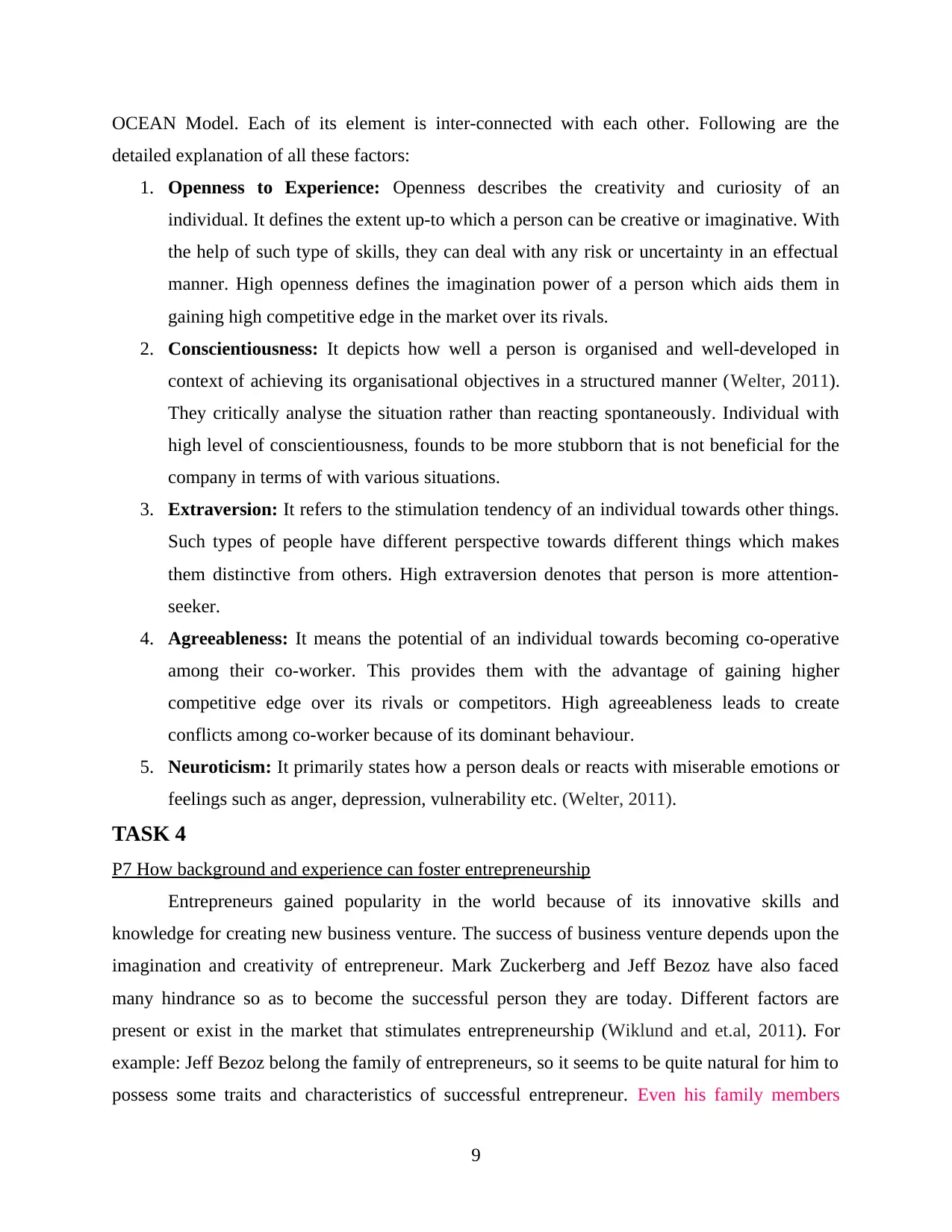
OCEAN Model. Each of its element is inter-connected with each other. Following are the
detailed explanation of all these factors:
1. Openness to Experience: Openness describes the creativity and curiosity of an
individual. It defines the extent up-to which a person can be creative or imaginative. With
the help of such type of skills, they can deal with any risk or uncertainty in an effectual
manner. High openness defines the imagination power of a person which aids them in
gaining high competitive edge in the market over its rivals.
2. Conscientiousness: It depicts how well a person is organised and well-developed in
context of achieving its organisational objectives in a structured manner (Welter, 2011).
They critically analyse the situation rather than reacting spontaneously. Individual with
high level of conscientiousness, founds to be more stubborn that is not beneficial for the
company in terms of with various situations.
3. Extraversion: It refers to the stimulation tendency of an individual towards other things.
Such types of people have different perspective towards different things which makes
them distinctive from others. High extraversion denotes that person is more attention-
seeker.
4. Agreeableness: It means the potential of an individual towards becoming co-operative
among their co-worker. This provides them with the advantage of gaining higher
competitive edge over its rivals or competitors. High agreeableness leads to create
conflicts among co-worker because of its dominant behaviour.
5. Neuroticism: It primarily states how a person deals or reacts with miserable emotions or
feelings such as anger, depression, vulnerability etc. (Welter, 2011).
TASK 4
P7 How background and experience can foster entrepreneurship
Entrepreneurs gained popularity in the world because of its innovative skills and
knowledge for creating new business venture. The success of business venture depends upon the
imagination and creativity of entrepreneur. Mark Zuckerberg and Jeff Bezoz have also faced
many hindrance so as to become the successful person they are today. Different factors are
present or exist in the market that stimulates entrepreneurship (Wiklund and et.al, 2011). For
example: Jeff Bezoz belong the family of entrepreneurs, so it seems to be quite natural for him to
possess some traits and characteristics of successful entrepreneur. Even his family members
9
detailed explanation of all these factors:
1. Openness to Experience: Openness describes the creativity and curiosity of an
individual. It defines the extent up-to which a person can be creative or imaginative. With
the help of such type of skills, they can deal with any risk or uncertainty in an effectual
manner. High openness defines the imagination power of a person which aids them in
gaining high competitive edge in the market over its rivals.
2. Conscientiousness: It depicts how well a person is organised and well-developed in
context of achieving its organisational objectives in a structured manner (Welter, 2011).
They critically analyse the situation rather than reacting spontaneously. Individual with
high level of conscientiousness, founds to be more stubborn that is not beneficial for the
company in terms of with various situations.
3. Extraversion: It refers to the stimulation tendency of an individual towards other things.
Such types of people have different perspective towards different things which makes
them distinctive from others. High extraversion denotes that person is more attention-
seeker.
4. Agreeableness: It means the potential of an individual towards becoming co-operative
among their co-worker. This provides them with the advantage of gaining higher
competitive edge over its rivals or competitors. High agreeableness leads to create
conflicts among co-worker because of its dominant behaviour.
5. Neuroticism: It primarily states how a person deals or reacts with miserable emotions or
feelings such as anger, depression, vulnerability etc. (Welter, 2011).
TASK 4
P7 How background and experience can foster entrepreneurship
Entrepreneurs gained popularity in the world because of its innovative skills and
knowledge for creating new business venture. The success of business venture depends upon the
imagination and creativity of entrepreneur. Mark Zuckerberg and Jeff Bezoz have also faced
many hindrance so as to become the successful person they are today. Different factors are
present or exist in the market that stimulates entrepreneurship (Wiklund and et.al, 2011). For
example: Jeff Bezoz belong the family of entrepreneurs, so it seems to be quite natural for him to
possess some traits and characteristics of successful entrepreneur. Even his family members
9
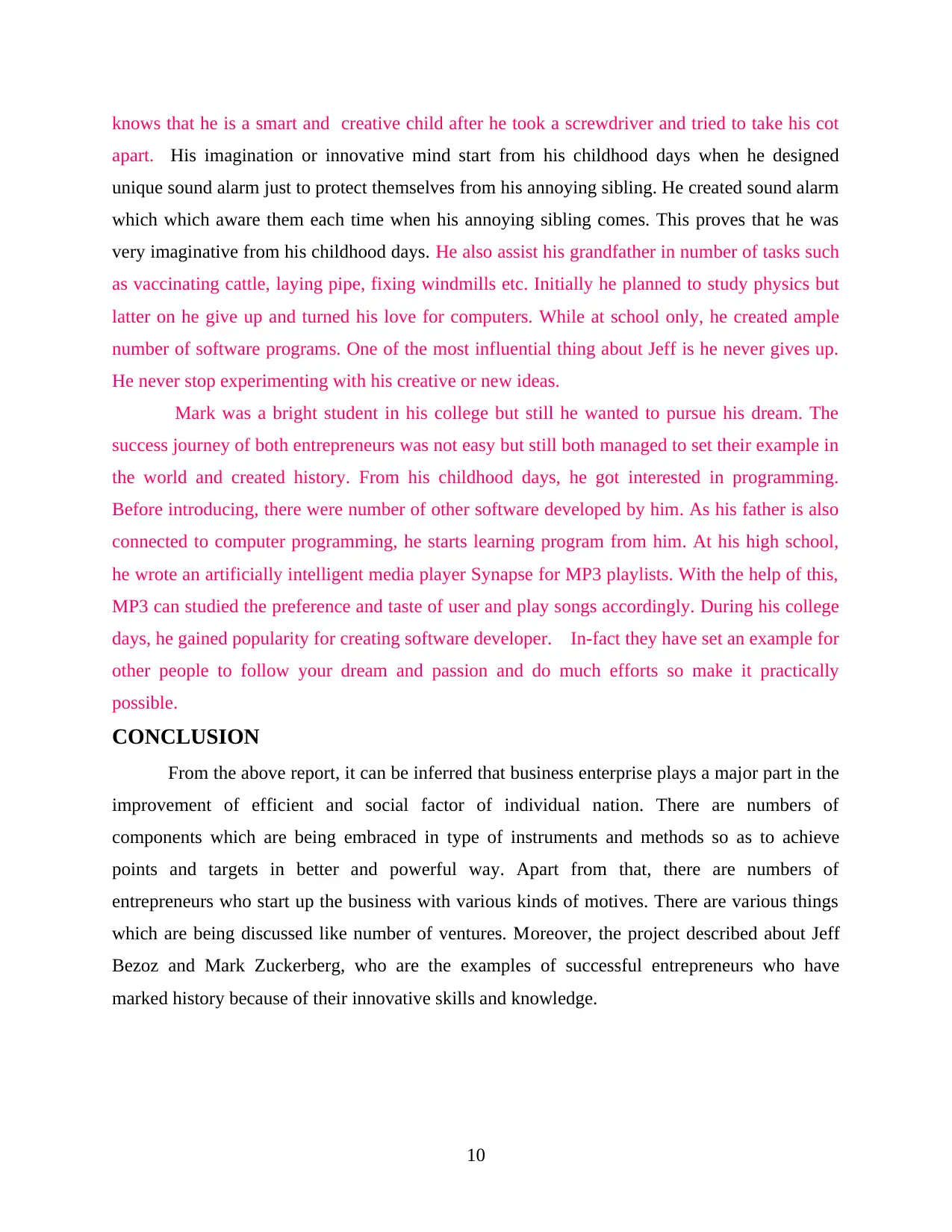
knows that he is a smart and creative child after he took a screwdriver and tried to take his cot
apart. His imagination or innovative mind start from his childhood days when he designed
unique sound alarm just to protect themselves from his annoying sibling. He created sound alarm
which which aware them each time when his annoying sibling comes. This proves that he was
very imaginative from his childhood days. He also assist his grandfather in number of tasks such
as vaccinating cattle, laying pipe, fixing windmills etc. Initially he planned to study physics but
latter on he give up and turned his love for computers. While at school only, he created ample
number of software programs. One of the most influential thing about Jeff is he never gives up.
He never stop experimenting with his creative or new ideas.
Mark was a bright student in his college but still he wanted to pursue his dream. The
success journey of both entrepreneurs was not easy but still both managed to set their example in
the world and created history. From his childhood days, he got interested in programming.
Before introducing, there were number of other software developed by him. As his father is also
connected to computer programming, he starts learning program from him. At his high school,
he wrote an artificially intelligent media player Synapse for MP3 playlists. With the help of this,
MP3 can studied the preference and taste of user and play songs accordingly. During his college
days, he gained popularity for creating software developer. In-fact they have set an example for
other people to follow your dream and passion and do much efforts so make it practically
possible.
CONCLUSION
From the above report, it can be inferred that business enterprise plays a major part in the
improvement of efficient and social factor of individual nation. There are numbers of
components which are being embraced in type of instruments and methods so as to achieve
points and targets in better and powerful way. Apart from that, there are numbers of
entrepreneurs who start up the business with various kinds of motives. There are various things
which are being discussed like number of ventures. Moreover, the project described about Jeff
Bezoz and Mark Zuckerberg, who are the examples of successful entrepreneurs who have
marked history because of their innovative skills and knowledge.
10
apart. His imagination or innovative mind start from his childhood days when he designed
unique sound alarm just to protect themselves from his annoying sibling. He created sound alarm
which which aware them each time when his annoying sibling comes. This proves that he was
very imaginative from his childhood days. He also assist his grandfather in number of tasks such
as vaccinating cattle, laying pipe, fixing windmills etc. Initially he planned to study physics but
latter on he give up and turned his love for computers. While at school only, he created ample
number of software programs. One of the most influential thing about Jeff is he never gives up.
He never stop experimenting with his creative or new ideas.
Mark was a bright student in his college but still he wanted to pursue his dream. The
success journey of both entrepreneurs was not easy but still both managed to set their example in
the world and created history. From his childhood days, he got interested in programming.
Before introducing, there were number of other software developed by him. As his father is also
connected to computer programming, he starts learning program from him. At his high school,
he wrote an artificially intelligent media player Synapse for MP3 playlists. With the help of this,
MP3 can studied the preference and taste of user and play songs accordingly. During his college
days, he gained popularity for creating software developer. In-fact they have set an example for
other people to follow your dream and passion and do much efforts so make it practically
possible.
CONCLUSION
From the above report, it can be inferred that business enterprise plays a major part in the
improvement of efficient and social factor of individual nation. There are numbers of
components which are being embraced in type of instruments and methods so as to achieve
points and targets in better and powerful way. Apart from that, there are numbers of
entrepreneurs who start up the business with various kinds of motives. There are various things
which are being discussed like number of ventures. Moreover, the project described about Jeff
Bezoz and Mark Zuckerberg, who are the examples of successful entrepreneurs who have
marked history because of their innovative skills and knowledge.
10
⊘ This is a preview!⊘
Do you want full access?
Subscribe today to unlock all pages.

Trusted by 1+ million students worldwide
1 out of 13
Related Documents
Your All-in-One AI-Powered Toolkit for Academic Success.
+13062052269
info@desklib.com
Available 24*7 on WhatsApp / Email
![[object Object]](/_next/static/media/star-bottom.7253800d.svg)
Unlock your academic potential
Copyright © 2020–2026 A2Z Services. All Rights Reserved. Developed and managed by ZUCOL.




